Content marketing is nothing new, and if you’re here, it’s because you know exactly how important it is for securing organic, high-quality inbound leads. But there are different ways to tackle your content marketing strategy, with the two main methods being to take a DIY, in-house approach, or to work with a content agency.
Owning your content strategy in a DIY-fashion might sound appealing. Off the top, it can seem like the more cost-effective option, and if you have a skillful marketing team already on board, content marketing might even be in their wheelhouse. But even if your org seems well-positioned to tackle content marketing strategy in-house, this might be a grave mistake.
The truth is that it’s rare for an in-house content marketing strategy to approach the depth, breadth, and success that a content agency can achieve. There are many surefire reasons why this is the case, from the pace and velocity of content, to keeping up with optimizations and the algorithms.
Here’s everything you need to know about working with a content agency, including why a DIY approach likely won’t lead to the results you’re looking for.
Content Marketing: What it Requires
For us to understand the benefits of working with a content agency versus a DIY approach, it’s important to dive into exactly what content marketing entails.
First up, what exactly is content marketing and why does it matter? Content marketing is the process of creating and distributing valuable, relevant, and consistent content to attract and retain an audience, which is typically your ideal customers. This content can take many forms, including blog posts, articles, social media content, infographics, videos, and even podcasts.
Content marketing is designed to convert, and it can achieve different goals. Whether you’re angling for increased visibility or more high-quality leads, content marketing can help you get there. But for that to be the case, it can’t just look and sound nice: it needs to rank highly on the pages of search engines. And that’s where things get a little tricky.
How do you measure success in content marketing? First, you need to create content that’s engaging and technically accurate. But then, this content needs to be discoverable. Your prospective customers should stumble across your content while they’re searching for answers to their pain points on Google.
To drive the point home, here are the two elements to content marketing that we need to get right, in order for our content to be “successful.”
- The content needs to be engaging, original, and technically accurate.
- It needs to rank highly in the search engines for keywords your audience is searching.
While these two points might seem simple enough, there is a ton of strategy and effort that goes into making them both a reality.
“I think in general, people know that they need to create content,” said Desiree Rose, all-star Content Manager here at RevenueZen. “But they rarely understand the how or the why… [these] are extremely important when looking at content.”
A High-Performing Content Marketing Strategy
Let’s dig in a little further, and talk about what a high-performing content marketing strategy might look like. This is just part of the exact process our team here at RevenueZen uses for our content marketing clients.
1. Content audits
All of your content needs to be a valuable resource center that aligns with what your customers are searching for. Start by taking inventory of all of your existing content, audit it, and analyze key metrics about its performance. Then, you can create an improvement plan.
2. Content strategy
Before starting content production, you need to develop a content strategy. Decide on target keywords, talk through content ideas, and align topics to your buyers journey, so it actually meets customers where they are. Then, you can assign due dates in an editorial calendar, and start production.
Your strategy will likely mainly consist of blog content and solutions pages. Blog content is a primary source of how people consume information, and you should create posts that build topical authority and create brand awareness. Also, create laser-focused solutions pages around your key use cases, products, and services.
As content is published, you should use incoming data about keyword rankings and content performance to inform future content production and ongoing optimizations.
3. Technical, on-page, and off-page SEO
There are plenty of i’s to dot and t’s to cross when it comes to SEO. Onpage SEO refers to optimizing the content on your page for search engines, and includes title tags, URLs, and internal link structure. Technical SEO is the process of optimizing your website and server performance, which helps search engines find, crawl, and index the pages on your site. And off-page SEO refers to actions you take outside of your website to help your site rank, and includes practices such as link building.
The (Honest) Challenges of DIY Content Marketing
As you read the steps involved in a content marketing strategy you might think, Why would we work with a content agency? We can handle that!
Listen, we get it. Content marketing isn’t rocket science or brain surgery, and if you have the right team and resources in place, it’s very likely that you might be able to handle content marketing in-house. But we often find that organizations aren’t well-positioned to achieve the results that they want.
After working with tons of companies like yours on their content marketing strategy, here are some of the honest challenges that we’ve seen come with a DIY-approach.
1. There’s a difference between vision and execution
Knowing what it takes to achieve your goals with SEO and content marketing is one thing. But actually being able to execute it is another beast entirely. For content marketing to actually lead to a packed inbound pipeline you need to take a tactical, aggressive approach to content marketing, which is entrenched in data and high-quality content. Organizations often know why content marketing matters, and can even grasp what it takes for it to be successful, but seldom have the full set of resources to execute their vision.
2. Marketers are not always SEO & content marketing savvy
There are many different types of marketers, and not all marketing is created equal. And it’s often the case that marketers in an org might be excellent at PPC, email marketing, affiliate marketing, and email marketing, but might know much about content marketing and SEO. They are worlds apart, as far as processes and protocols are concerned, and require different skills and expertise.
3. Those with the knowledge don’t have the bandwidth
Here’s another scenario we often see: a marketer in an organization has the knowledge and skills relevant for successful content marketing, but they don’t have the bandwidth to execute.
Something we see often here at RevenueZen is that clients will get their content briefs from us (we offer brief creation as a service), and they’ll want to physically write the articles themselves. But we often see them struggle with keeping up with the pace and consistency necessary for success. “Oftentimes if you’re producing optimized content, you’re not going to be able to produce it at a regular cadence for publishing, which Google loves,” said Desiree. “And then, if you do produce content quickly to get those metrics up and increase the value of the content, then you’re oftentimes missing the optimization process.”
4. The quality of content takes a hit
When it comes to orgs writing their own content, there’s also a quality issue that can come up. “With a lot of people doing DIY, or having AI writing for them, we’re just seeing a lot of content missing the point,” Desiree said. And it’s true: while AI writing tools are all-the-rage, they (at this point) do not create 100% ready-to-deploy content. Firstly, the content needs to be fact-checked for accuracy. Next, it needs to be made readable (right now, AI-generated content reads as such pretty clearly). Thirdly, it needs to be SEO optimized, and someone needs to run through it to execute on-page and off-page SEO optimizations.
In summary: whether it’s a spread-thin marketer who is struggling to churn out content, or AI-assisted writing that’s not fine-tuned, DIY-content can often miss the mark.
The Pros of Working with a Content Agency
So, there are some pretty significant flaws that can come with a DIY approach to content marketing. But what are the upsides of working with a content agency?
Here are just some of the benefits of working with a content agency:
1. Their work is rooted in research and backed by data
Goodbye, haphazard approaches to content marketing. Instead of guessing which terms to target and “throwings things at the wall,” your partner content agency will start with intense research. They’ll dive into your org, its strategic narrative and its goals. They’ll get to know your market and conduct a competition analysis, to see what your competitors are doing right, and what they’re missing. And they’ll sink their teeth into your audience, to understand what they want and what their pain points are.
Ultimately, all of this research will inform a highly-targeted content marketing strategy.
2. They know how to target terms your buyers are actually searching
The key to successful content marketing is to target relevant keywords your audience is actually searching for. And how do you do that? By understanding your buyer’s journey, funnel content, and using keywords that actually align with what people are searching for at different stages of awareness.
3. Work will be produced at the necessary consistency and quality
As we’ve touched on, the quality and consistency of your content is crucial for achieving results. When you partner with one of the leading content agencies, you’ll get high-quality content at whatever pace is necessary for the results you’re eager for.
4. They’ll use iteration to continuously improve results
Content agencies don’t take a “set it and forget it” approach. As they execute their strategy, they’re constantly monitoring the results and looking for ways to improve. Is the content we’re publishing achieving the results we’re looking for? What new keywords can we target? How can we drive more people to certain pages? Which successful efforts can we double down on? Content agencies take an active, aggressive approach to perfecting their strategy, and to continuously improving it.
5. They can scale as you do
Whether you’re a small business that’s new to content marketing or a large enterprise with complex offerings, your partner content agency can meet you where you are today, and scale with you as you grow. If you start out with a modest arrangement but experience growth, you can add on services to meet your needs.
What Does a Content Agency Even Do?
So you’re thinking of partnering with a content agency for your content marketing needs. What exactly can you expect them to own in your organization, and what will this partnership look like?
Here is just some of the work you can expect a content agency to do:
1. Data-driven keyword research
Your content agency will deep-dive into your business, market, and customers, to come up with relevant keywords to target. They will likely take a “hub and spoke” approach, which involves first targeting key, core terms, before branching out and addressing related terms. They’ll consider factors such as search volume, competitiveness, and the search intent of the audience, to come up with terms real people are actually typing into Google.
2. Audit existing content
Your content marketing partner will know that SEO errors on existing pages can prohibit your site from ranking. Because of this, they’ll conduct an in-depth SEO audit of your existing pages and posts, scrutinizing them for issues which might cause trouble when it comes to ranking or readability. These audits will also hit technical SEO, to ensure your site is properly crawled and indexed (which is crucial for rankings). At this point, any underperforming or misaligned content can be improved, or even removed from your site altogether.
3. In-depth competitor analysis
Your content isn’t created in a vacuum, and it’s important to understand the landscape of your competition, for several reasons. First, when you see what’s working for your competitors (as far as content goes), you can seek to recreate it in your own way. Next, when you see where their gaps are, you can look for ways to edge ahead. For example, if there’s a big keyword or topic your competitors aren’t touching or aren’t successful with, perhaps that’s a space where your brand can solidify itself as a leader.
When you’re working with a partner agency, they’ll analyze what your competitors are doing and will dissect their content marketing strategies, so you can break through the ranks and take advantage of any deficits.
4. On-page, off-page, and technical SEO practices
Getting content to rank requires a methodical approach to all of the elements of SEO, including on-page and off-page optimizations, and technical SEO. Don’t worry, your partner SEO agency has you covered. They’ll optimize any existing content, including your home page and service pages, as well as any current blog content. They’ll also own link building, URL optimization, and tag structure, for example.
5. Consistent content creation
With your strategy set and your current content optimized, your partner agency will produce content at the pace necessary to change the tides in the search engines. This will likely be at least several pieces of content a month (and can be much higher), deployed at a regular cadence.
6. Updates and ongoing support
Lastly, your content agency will supply you with regular status updates and check-ins. You might have a monthly meeting, for example, where your partner agency transparently shares results and discusses your strategy going forward. Your team can also share any insights or updates. For example, maybe you’re launching a new feature and you want to target keywords surrounding it.
The Top 6 Content Agencies You Should Consider Working With
Now that you understand what exactly a content agency does and why you should likely work with one, here’s a list of the top 6 content agencies in the landscape, which you should consider working with.
1. RevenueZen
Oh, hello there 👋 Yes, we’re kicking off this list with ourselves, but don’t worry: we’re also going to introduce you to our competitors. That’s because we’re firm believers in the quality and caliber of our work, and we think that we might be the perfect fit for one another. You can check out our track record of successful content marketing and SEO work, and see how we consistently produce incredible results.
A bit about us: our team is made up of content-obsessed SEO experts, who have a wealth of knowledge in this industry and landscape. We know how to leverage the power of content marketing to help you achieve your business goals, and it’s something that we’re genuinely excited about.
Our results speak for themselves. We rank in the top 10 for some of the most sought-after search terms in our own industry, including:
- “B2B inbound marketing”
- “SaaS technical SEO”
- “B2B SEO services”
- “B2B SEO agency”
- “How to post on LinkedIn”
- “B2B SEO agencies”
- “SaaS website best practices”
(Psst… if you found this post by searching on Google, then it means we’ve accomplished our own goal with this post).
Our content marketing services include robust research, meticulous keyword selection, on-page audits, SEO & link building practices, competitive gap analysis, and off-page SEO.
One other thing about us? We’re dedicated to working with brands and people who are a one-to-one perfect fit for our services. That’s why we’re happy to introduce you to some of our competitors. We’re not afraid of a little competition, and know our results and our work speaks for itself.
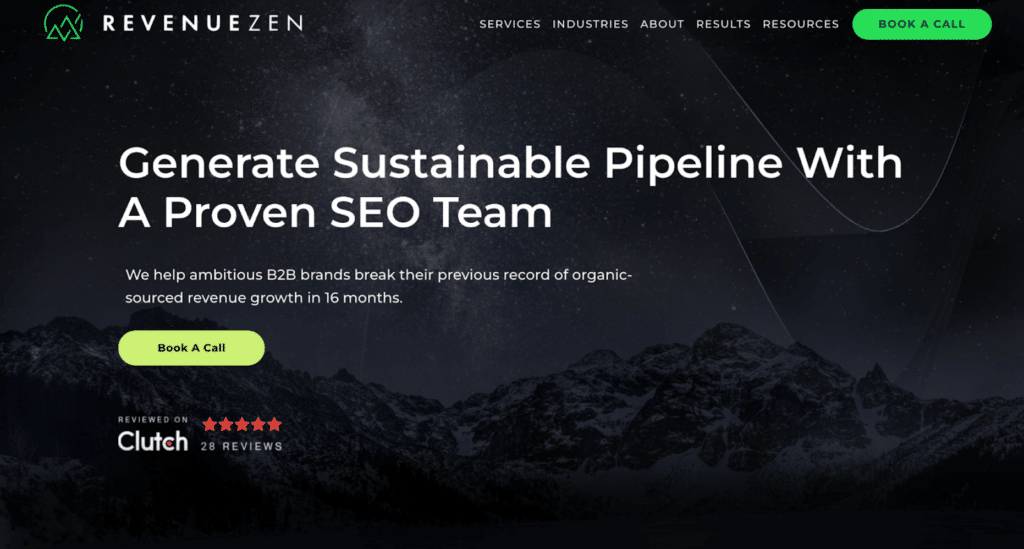
2. Manifest
Manifest says they’re an “award winning marketing agency specializing in content marketing, content strategy, and creating meaningful brand experiences.” A differentiator with Manifest is that they say they have “journalistic rigor,” and they specialize in “journalistic content.” Aside from branded content, Manifest also offers digital experiences.
Manifest’s resume includes many large brands, such as Delta, Staples, Marriott, and Wells Fargo. While they clearly have extensive experience and capabilities, they don’t clearly demonstrate if they work with small and mid-sized brands.
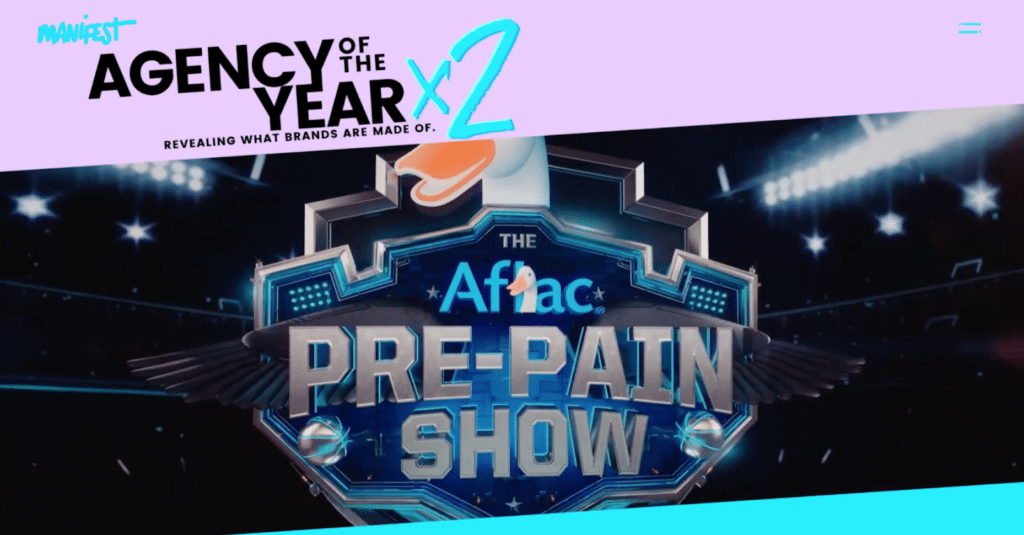
3. 256 Content
256 Content says they’re “full-service, creative content marketing agency,” and that they can help your org “craft and scale content experiences that grow brand love, build community and drive revenue.” Their services include content strategy, data analytics, content managed service (to create + distribute content), and video production (with their in-house team). They say their sector expertise includes travel & hospitality, SaaS, financial services & FinTech, and B2B marketing.
This is another agency with more big names under its belt, including Mastercard and Special Olympics. Similarly to Manifest, this agency clearly does top-tier work, but it’s not clear what they do in the realm of small and mid-sized brands, and how much they can hone in on content and SEO.

4. Dialogue
Dialogue says they’re a “full-service content agency,” and that they specialize in “connecting brands with consumers by creating engaging visual and written content across all channels.” Dialogue says they “develop content strategy and provide creative solutions including design, copywriting, image, [and] video.” Their services include content strategy and branding, digital design, email, web and social videos, copywriting, and social media content.
Dialogue offers a wide array of services, but they don’t appear to laser-in on SEO and content marketing to the depth that other agencies might.
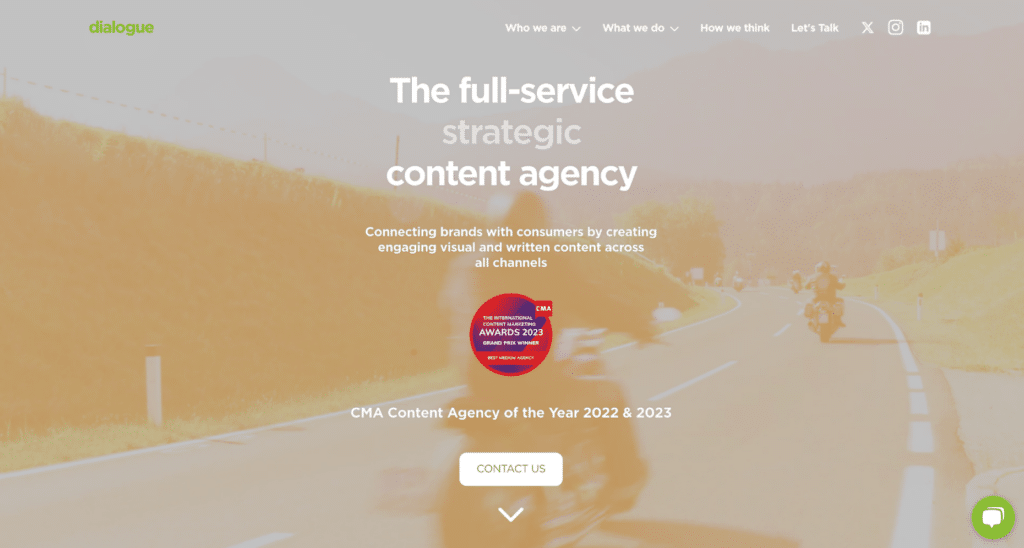
5. Influence & Co.
Influence & Co. says it’s a “results-driven content marketing agency,” which “makes content marketing simple by providing a collaborative solution to help companies strategize, create, publish, and maximize content.” They say their content drives business results, and can help you accomplish goals such as lead generation, SEO, sales enablement, and thought leadership. Their content marketing services include content audits, content strategy, keyword research, and technical website audits.
While Influence & Co. appears to really dial-in their content services, it’s not clear if they focus on tactical elements such as strategic narrative, topical authority, and buyer’s journey when creating content.
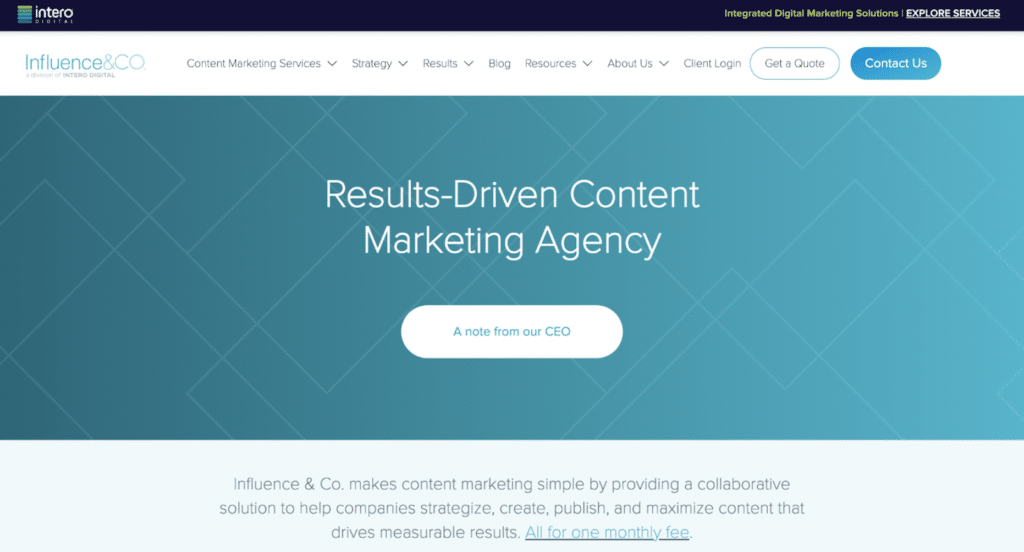
6. Contentellect
Contentellect is a content marketing agency specializing in delivering high-quality content and strategic link-building services to enhance clients’ online presence.
Their offerings include SEO-optimized blog content, professionally designed eBooks, and compelling product descriptions tailored for eCommerce platforms. Additionally, they provide outreach services such as guest post link building, HARO outreach for acquiring high-authority backlinks, and PR services that secure features on major news outlets like Fox, CBS, NBC, and ABC News.
With a focus on scalable solutions, Contentellect caters to startups, SMEs, and agencies, aiming to boost organic traffic and improve search engine rankings through effective content and link strategies.
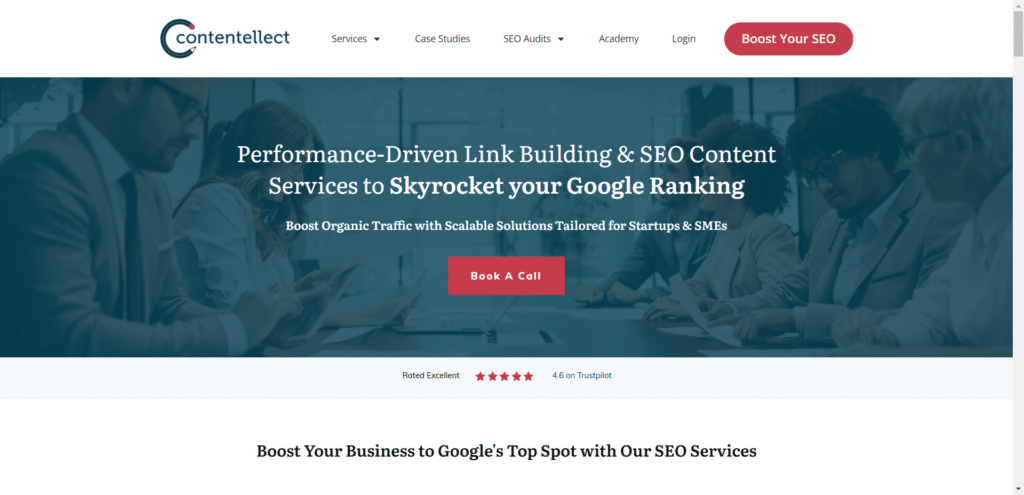
It’s a Match: Let RZ Own Your Content Strategy
When it comes to finding a content agency, it’s crucial you select one that’s going to deliver on its promises and help you achieve your organizational goals. If you’re ready to leverage the power of your content to take your business to new heights, let’s talk.
We’re RevenueZen, and we help ambitious B2B brands break their previous record of organic-sourced revenue growth in 16 months. We’re obsessed with all things content marketing, and we’re proud of the results we produce for our clients.
Let us show you how content can transform your business. Book a call today to get started.




